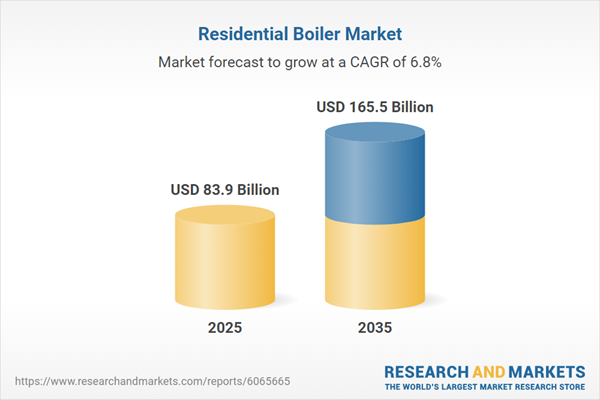Market growth is fueled by extreme weather conditions, rising urbanization, and the increasing integration of smart home technologies. Homeowners are seeking efficient space heating solutions to maintain comfort during extended cold seasons, while ongoing infrastructure upgrades further drive demand. Residential boilers provide centralized heating and hot water throughout homes, delivering consistent indoor temperatures and a reliable water supply. Their energy efficiency, durability, and user-friendly operation are key factors boosting adoption. Advanced models now incorporate automated temperature control, safety mechanisms, and smart grid compatibility, enabling optimized energy consumption. Government subsidies, environmental incentives, and compact boiler designs for apartments are also playing a pivotal role in stimulating market growth. Rising awareness of energy conservation and low-emission technologies is shaping future demand for modern, high-performance residential boilers.
The 24 kW segment accounted for a 40% share in 2025 and is expected to grow at a CAGR of 6.5% through 2035. Growth in this segment is supported by demand for compact, energy-efficient heating solutions suitable for small homes and apartments. Urbanization, cost-effective installation, and adherence to energy-efficiency standards are further accelerating adoption. These boilers remain popular due to their reliable performance, compact form factor, and affordability.
The single-family home segment held a 59.7% share in 2025 and is expected to reach USD 95 billion by 2035. Homeowners increasingly prefer efficient, dependable boilers that provide both heating and hot water. Easy installation, space-saving designs, and energy-efficient performance continue to drive adoption, while advancements in smart control systems and low-emission technologies are influencing buyer preferences. Rising urban development, environmental awareness, and emphasis on sustainable living further support growth in this segment.
North America Residential Boiler Market held 80% share, generating USD 2.4 billion in 2025. Growth in this market is propelled by strict government regulations targeting carbon emission reduction, rising disposable incomes, and increasing consumer demand for advanced, energy-efficient heating systems. High living standards and strong awareness of smart heating technologies contribute to steady industry momentum.
Key players in the Global Residential Boiler Market include ACV International, A.O. Smith, Ariston Holding, BDR Thermea Group, Bradford White Corporation, Bosch Thermotechnology Corp., Carrier, Ferroli, Hoval, Laars Boilers, Lennox International, Lochinvar, Navien, NTI Boilers, Noritz America Corp., PB Heat, Rinnai America Corporation, Smith Boilers, Thermona, U.S. Boiler Company, Viessmann, Vaillant Group, WM Technologies, and Wolf. Companies in the Global Residential Boiler Market are strengthening their foothold through multiple strategies. They focus on product innovation, introducing energy-efficient, compact, and smart-grid-compatible boilers tailored to urban homes. Expansion into emerging markets, strategic acquisitions, and collaborations allows firms to broaden distribution networks and capture new customer segments. Investments in research and development aim to enhance product reliability, low-emission performance, and integration with home automation systems.
Comprehensive Market Analysis and Forecast
- Industry trends, key growth drivers, challenges, future opportunities, and regulatory landscape
- Competitive landscape with Porter’s Five Forces and PESTEL analysis
- Market size, segmentation, and regional forecasts
- In-depth company profiles, business strategies, financial insights, and SWOT analysis
This product will be delivered within 2-4 business days.
Table of Contents
Companies Mentioned
The companies profiled in this Residential Boiler market report include:- ACV International
- Ariston Holding
- A.O. Smith
- BDR Thermea Group
- Bradford White Corporation
- Bosch Thermotechnology Corp.
- Carrier
- Ferroli
- Hoval
- Laars Boilers
- Lennox International
- Lochinvar
- Navien
- NTI Boilers
- Noritz America Corp.
- PB Heat
- Rinnai America Corporation
- Smith Boilers
- Thermona
- U.S. Boiler Company
- Viessmann
- Vaillant Group
- WM Technologies
- Wolf
Table Information
| Report Attribute | Details |
|---|---|
| No. of Pages | 180 |
| Published | December 2025 |
| Forecast Period | 2025 - 2035 |
| Estimated Market Value ( USD | $ 83.9 Billion |
| Forecasted Market Value ( USD | $ 165.5 Billion |
| Compound Annual Growth Rate | 6.8% |
| Regions Covered | Global |
| No. of Companies Mentioned | 25 |









